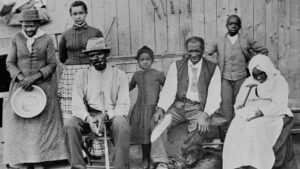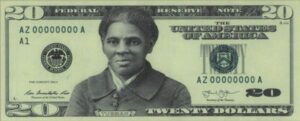Harriet & Slave Ancestry
December 1, 2020Abolitionist Harriet Tubman (1822-1913) stands with a group of formerly enslaved people she helped lead to freedom. Photo: Bettmann/Getty
AXIOS
A database that gathers records about the lives of enslaved Africans and their descendants is undergoing a massive, crowdsource-powered expansion to unlock Black Americans’ genealogical histories, organizers tell Russell Contreras.
- Why it matters: The initiative, to be unveiled today by Enslaved.org, is the latest to reconstruct lost or incomplete timelines and records from the 1600s-1800s, as the U.S. and other nations reckon with systemic racism.
How it works: The general public and outside researchers can submit family histories, runaway slave ads, or documents of purchase to Enslaved.org.
- Users can search their names and town histories and connect the experiences of enslaved people, from voyages to the changing of names.
First look: Slavery ancestor project expands
Whatthey’resaying: Jessica Ann Mitchell Aiwuyor, founder of the National Black Cultural Information Trust, said African Americans have long sought to reclaim their past amidst hostility.
- “Even after the Civil War, former enslaved people put ads in newspapers looking for lost family members,” she said. “This website is a continuation of that tradition as we look for our past and family but this time in a digital space.
We shouldn’t wait another 10 years to see Harriet Tubman on a $20 bill | Quigley
By Joan Quigley | For The Jersey Journal
This is the year we were supposed to get new $20 bills featuring a portrait of Harriet Tubman. I can’t say it would have been perfect timing because having a woman on American currency was already long overdue, but it sure is a really bad time for a postponement.
[…]
The timing was originally planned to coincide with the 100th anniversary of the 19th Amendment this month, granting women the right to vote. The new bill design was shown in 2011 while Barack Obama was still president, and the bill was supposed to hit banks in March 2020.
But even before he was elected, Trump opposed the idea of taking Andrew Jackson off the twenty. He is one of Trump’s heroes so he proposed putting Tubman on the $2 bill, you know, the one that’s barely in circulation any more. He felt putting her on any bill was “pure political correctness.”
Moreover,
he still supports Jackson, whose racism wasn’t limited to African-Americans but included Native Americans, as well. He recently took strong action to ensure Jackson’s statue remains standing just outside the White House.
Treasury Secretary Steven Mnuchin, almost as soon as he was appointed, agreed to stall. The women’s suffrage anniversary is coming soon with no Tubman twenties.
[…]
Meanwhile, Governor Larry Hogan of Maryland, where Tubman was born, wrote a letter to Mnuchin urging him to speed up the process. Sen. Jeanne Shaheen, D-NH, introduced a bill directing the Treasury to print Tubman’s portrait on all $20 bills starting in 2021.
“The Trump administration’s indefinite postponement of this redesign is offensive to women and girls, and communities of color, who have been excitedly waiting to see this woman and civil rights icon honored in this special way. The needless foot-dragging on this important effort is unacceptable. Our currency tells our country’s story and it is past time to honor the contributions of Harriet Tubman,” Shaheen said.
Symbols do matter. Maybe now more than ever.
2020 Care 100
Welcome to the Care 100, a first-of-its-kind list of the people doing the most to re-imagine and re-humanize our care system. You’ll find everyone from policy renegades to direct service providers, from tech entrepreneurs to documentary filmmakers. While these dynamic leaders all tackle the problems and opportunities of care in this country in vastly different ways, they share a common ethos: that care is fundamental to our collective thriving, and must be honored as such.
The future of care—how we parent, heal, and age—is here and these are the people designing it.
The care system touches every sector, so you will find these 100 extraordinary people anywhere and everywhere: start-ups, corporations, nonprofit organizations, government, education, the arts. We were less interested in where they work as we were in how they work; you’ll find that there are 10 honorees in each of 10 approaches.
In case you’re curious, this was our criteria:
*Re-imagining the field
*Anti-racist and anti-sexist
*Human-centered
*Silo-busting
*Expectation-raising
*Unapologetically joyful
*Imaginative and solving real problems for real people
This list weaves together and celebrates the dynamic people advancing the broader care system (which we all too often think of in silos, like managing the household, fighting for benefits in our workplaces, caring for our aging relatives, building community in our neighborhoods etc.). Our hope is that the list makes these folks feel honored, but also that it helps people see and be seen by new collaborators and supporters, and that it ushers in a new era of creativity and recognition for care across the country. It turns out, a lot of people don’t even see themselves as a part of the formal care system, so we had our work cut out for us.


